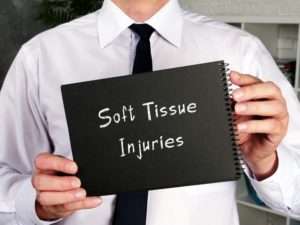
Some car accident injuries are more obvious than others, like a broken bone or scrapes and bruises. However, you can also suffer soft tissue injuries that can cause damage you won’t be able to see or recognize right away. Sometimes soft tissue injuries have been called hidden injuries because it can take time for you to experience the full range of symptoms. When you visit a car accident chiropractor after a wreck, they will examine you for all kinds of injuries, including soft tissue injuries you may not know you have right away. Soft tissue injuries refer to injuries that affect your muscles, tendons, ligaments, organs, and more inside the body. Oftentimes, damage to bones or joints after a car accident will also include soft tissue damage.
Five Common Soft Tissue Injuries from a Car Accident
Here are five examples of common soft tissue injuries you may experience if you were in a car accident.
Whiplash
Whiplash is the most common of all car accident injuries, especially with rear-end collisions. When a vehicle hits yours from behind, it can force your head and neck to snap forward and backward violently. This puts strain on your neck muscles that help hold up and support your head and neck. The pressure of this type of jostling can also negatively impact your spine by causing misalignments or even other injuries like a herniated disc. Symptoms of whiplash include pain in your head and neck, soreness and stiffness in your neck muscles, and reduced mobility in your neck.
Sprains
Sprains affect the ligaments in your body that connect bones and joints together. The force of impact from the car accident can put unnecessary amounts of pressure on your joints, like elbows, knees, or ankles. If the ligaments in one of your joints are overstretched or even torn, it can lead to an injury known as a sprain. If you have a sprain, you may experience pain in the immediate area and also experience difficulty moving that joint without soreness or stiffness.
Strains
Strains affect the muscles and tendons in your body that help support bones, joints, and your general day-to-day movements. Another expression for a strain is when you might say you have “pulled a muscle”. This sensation is painful and can make normal, everyday movements feel uncomfortable. Muscle or tendon strains can lead to muscle spasms and cramping in the area. You may also experience swelling and inflammation in the area.
Contusions
A contusion refers to a painful bruise you may develop from a car accident. Many people experience a blow to the body during a car accident, like if they hit their head on the steering wheel or injure their knee on the dashboard. Any serious blow to the body can create a painful bruise where blood actually pools underneath the skin at the site of injury, which is what causes the discoloration of the bruise. A serious contusion can also cause other complications and lead to permanent damage.
Spinal Injury
The spine is made up of joints called vertebrae, which run from the top of your neck through to your lower back. In between each of these vertebrae is a spinal disc, which is a spongy and fluid-filled circular disc that provides support and shock absorption for the spine. Each spinal disc is situated to help keep two vertebrae from rubbing against one another and to also absorb the shock from general, everyday movements. A car accident can jostle you enough that it can cause misalignments in the spine. These misalignments can affect both vertebrae and spinal discs that support them. If a spinal disc slips out of place or ruptures, it can cause back pain and nerve damage.
Diagnosis and Treatment for a Soft Tissue Injury After a Car Accident
When you visit a car accident chiropractor after a car accident, they will perform a physical examination to assess the damage your body has sustained. In addition to checking your spine, bones, and joints, they will also observe how your strength and mobility may have been negatively impacted. A car accident chiropractor may also want to run diagnostic imaging tests, like a CT scan, to get a clearer picture of how your muscles, tendons, and ligaments may be damaged. This can help inform an individualized treatment plan that addresses your specific healthcare needs.
Visit a car accident chiropractor in Tucker at our AICA Orthopedics office and receive comprehensive care for your car accident injuries.
